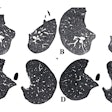In the view of some radiologists, the virtual glass is more than half full.
True, an existing national coverage decision ensures that Medicare won't reimburse virtual colonoscopy screening in the U.S. The Blue Cross and Blue Shield Association Technology Evaluation Center concluded just last year that CT colonography (CTC or VC) doesn't meet its technical criteria as an alternative to colonoscopy.
But as of this month, 29 states have finalized local coverage decisions at the Medicare Carrier Advisory Committee level authorizing VC reimbursement after incomplete colonoscopy. In December alone, carriers in 12 states moved from draft proposals to final authorization permitting VC reimbursement after failed colonoscopy.
During the first quarter of 2006, local coverage decisions are pending approval in six more states: Missouri, Arkansas, Oklahoma, New Mexico, Rhode Island, and Louisiana, according to Dr. Elizabeth McFarland, director of CT colonography at the Center for Diagnostic Imaging and adjunct professor of radiology at Washington University School of Medicine in St. Louis. She is also a member of the Reston, VA-based American College of Radiology's (ACR) Research and Technology Committee, which reviews third-party payors' policies.
Many of these carriers shell out for broader indications as well, such as VC after incomplete colonoscopy performed for any reason including screening. A few even reimburse for additional indications that VC advocates consider essential, such as in frail or elderly patients who should not undergo colonoscopy, patients taking anticoagulant medications, those with other conditions that put them at risk of bleeding, and symptomatic individuals who are unwilling to undergo diagnostic colonoscopy when indicated.
Without exception, the local Medicare providers that allow broader indications are in regions where local radiologists have actively communicated with them throughout the draft proposal process, said Dr. Matthew Barish, from the Boston University Medical Center, at the 2005 International Symposium on Virtual Colonoscopy in Boston.
The scattershot local process -- now the norm for emerging technologies, a CMS employee told AuntMinnie.com -- means that final regulations and payments vary widely.
"Massachusetts just changed the rule ... to expand coverage," Barish said, allowing "any (ICD-9) diagnosis code consistent with the indications of (VC) coverage, and it's much better because it doesn't give you a single list of indications."
Coverage in California is more restrictive, he said, allowing diagnostic VC reimbursement "only when medically necessary for treatment of patients with signs and symptoms of colon disease when diagnostic optical colonoscopy has failed or is incomplete due to obstruction and where the results are likely to impact further patient management," he said. Whether reimbursement is possible after failed screening colonoscopy seems unclear in the language of the final rule approved in July 2005.
Approval or no, many VC providers are unaware that reimbursement is available in their own states. Is yours covered?
Kathryn Keysor from the ACR's economics department has created a document for AuntMinnie.com members that summarizes VC-related Medicare coverage by carrier and by state as of December 2005, including links to the final Medicare policies. Click here to find your region.
Local Medicare policies can also be searched individually on the U.S. Centers for Medicare and Medicaid Services (CMS) Web site.
As for actually collecting the Medicare money, the devil is in the details, and there are plenty of them.
For example, in 2004 the American Medical Association's introduction of VC-specific Category III Current Procedural Terminology (CPT) payment codes (0066T for screening and 0067T for diagnostic) gave VC its own technology tracking codes, which used to document developing widespread use of emerging medical technologies.
Unlike Category I CPT codes, however, Category III codes do not have specific relative value units (RVUs) assigned to them. As a result, site-specific reimbursement levels are set by the individual Medicare providers. In fact, the optimal billing approach can remain a mystery from one case to the next, Barish said.
Use of the Category III code rather than a Category I code is mandatory if an appropriate Category III code is available. "You have to code at the highest level of specificity," Barish said. In practice, however, some providers have continued to use so-called "unlisted" Category I codes for CT abdomen/pelvis exams, hoping for an easier path to reimbursement.
Under this approach, the Category I codes for a routine CT of the abdomen and pelvis, with IV contrast in the supine position and no IV contrast in the prone position, would be CPT 74170, 72194, and 76375. These are combined with an accepted ICD-9 code supporting medical necessity (such as 789.00-789.09, abdominal pain, unspecified site).
One problem with this approach is that the reimbursement under Category I is for a CT exam, without compensation for the additional time and labor associated with performing virtual colonoscopy, Barish said. For its part, the ACR opposes the use of Category I codes for diagnostic CT colonography, a practice it considers underbilling.
Beyond local Medicare providers, a handful of private payors in Wisconsin, California, and perhaps elsewhere are now paying for screening VC. When private insurers do reimburse, the payments tend to be higher than Medicare's so they are worth pursuing, Barish said in his discussion.
A few other private insurers will reimburse for diagnostic VC under 0067T if approval is obtained before the exam. But such preapproval can be difficult and extremely time-consuming to obtain. One carrier insisted that CPT code 0067T couldn't possibly exist because CPT codes don't have letters at the end, Barish recounted.
Category III payments shouldn't be difficult to obtain, but they often are, Barish said. Quoting from the "Federal Register," which details all applicable U.S. regulations, Barish noted that "it is not reasonable to categorically deny payment for Category III codes," which are "simply more specific and functional versions of Category I codes." Yet many insurers categorically deny payment anyway, he said.
"Unfortunately, billing and reimbursement is not based on logical principles; it's based on local work done by radiologists talking to local medical directors of insurance companies and Medicare, trying to get appropriate coverage for a service that has sufficient evidence for at least these patients who could not or would not have conventional colonoscopy."
In a panel discussion at the VC symposium, Barish urged radiologists in states with restrictive or confusing reimbursement provisions -- or no VC coverage at all -- to take the time to locate their local Medicare providers, and to get involved in the approval process.
The ACR offers central networking and coordination to provide a liaison between physicians and third-party payors, McFarland wrote in an e-mail to AuntMinnie.com. The Medicare Carrier Advisory Committee set up by CMS and the Managed Care Network (MCN, private payors) can discuss local coverage decisions among physicians and respective payors at the state level. More information is available from the ACR's economics and health policy department at 800-227-5463, extension 4774.
By Eric Barnes
AuntMinnie.com staff writer
December 23, 2005
Related Reading
CMS approves VC after failed colonoscopy in Midwest, August 30, 2005
VC billing: Still hazy after all these years, November 19, 2004
HMO pays for screening virtual colonoscopy, June 4, 2004
CPT codes and the politics of virtual colonoscopy, April 30, 2004
Billing for VC: even the reimbursement is virtual, November 19, 2003
Copyright © 2005 AuntMinnie.com




















